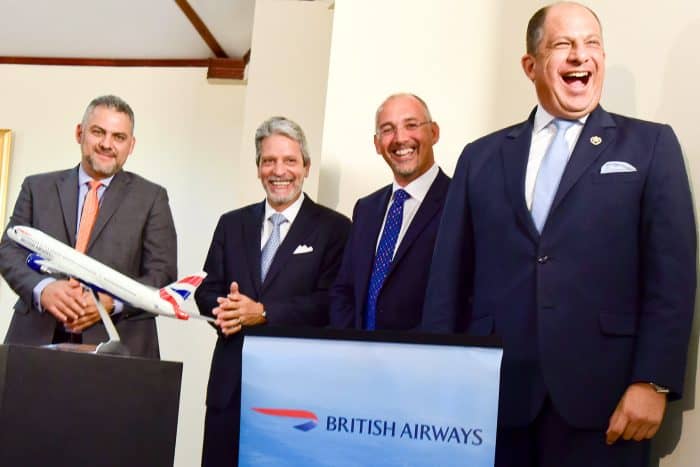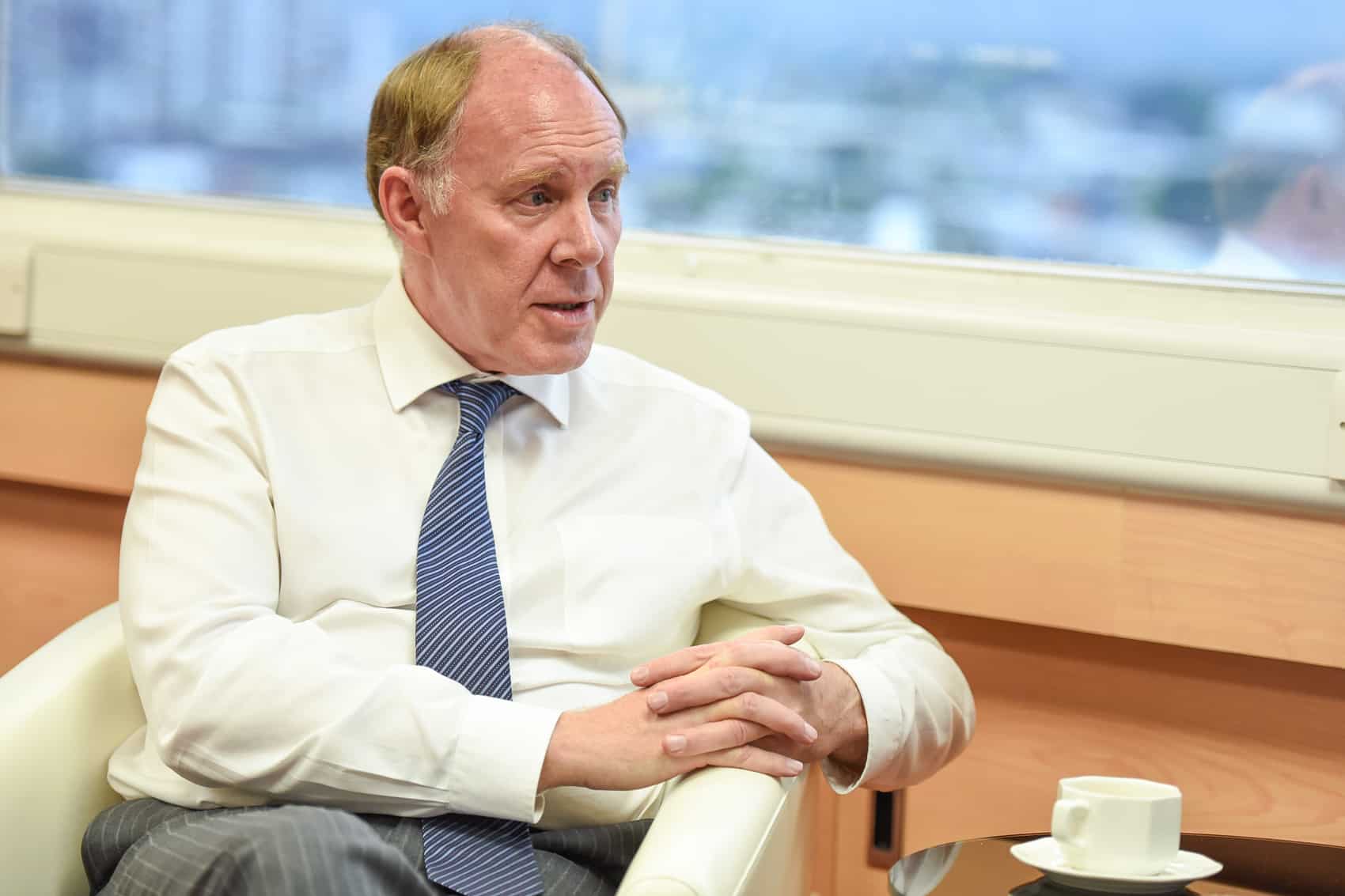Working in the foreign service away from friends and family can take its toll on a person. Especially if that person is British and can’t get Marmite.
The lack of readily available yeast extract was one small hurdle for Her Majesty’s new ambassador to Costa Rica and Nicaragua, Ross Patrick Denny, when he arrived here in October. He started his foreign service career in 1979 and has held three posts in Latin America, most recently as Her Majesty’s ambassador to Bolivia. In Costa Rica, Denny replaced outgoing Ambassadors Sharon and Christopher Campbell.
Denny and his wife, Claudia, and their 10-year-old daughter, Amanda, live in San José, but Denny splits his time between Costa Rica and Nicaragua. The new ambassador’s arrival in Costa Rica coincides with two new flights from Great Britain to Liberia and San José. Denny said he hopes that as more British tourists experience the country, it will contributed to greater ties and business opportunities between the U.K. and Costa Rica.
The Tico Times spoke with Denny at the British Embassy in San José earlier this month about the direction of British foreign policy in Latin America, the difficulty finding Marmite on store shelves, how the ambassador explains the British monarchy, and what he misses from home.
This interview has been edited for length and clarity.
Costa Rica must be a big change from Bolivia
Yes. My wife is there [in Bolivia] now filling out the paperwork to get our Labrador here. Costa Rica is a friendly, positive and open place. It’s a beautiful country, a nice place to be living as a family. Latin America is my favorite part of the world and always has been. My first posting was in Latin America and I’m delighted to be back. I’ve been in Chile, Brazil, Bolivia, Costa Rica: four very different countries. But there are similarities too. The warmth and friendliness of the people, the importance of family and other values.
You’ve had a long record of foreign service. What got you interested in it?
A lot of things that attracted me to my first job, which was in the Royal Navy. The idea of service to Queen and Country, which may sound a bit cheesy but, you know, still motivates a lot of us.
And travel. I thoroughly enjoyed my six years of travel in the Navy but I quickly discovered that traveling somewhere after weeks at sea and then being there for two days was rather fleeting. I was attracted to the idea of spending more time everywhere I went, getting underneath the skin of the country, learning the language. It was a logical transition.
How will you handle being ambassador to two countries?
This is new territory for me. It’s the first time I’ve been ambassador to two countries at the same time. When I was in Angola, I was deputy head of mission and also credited to São Tomé e Príncipe. I think the important thing is regular visits, to be a regular face, make contacts with the government and business sector and beyond. I’ll be based here and my child will go to school here and I hope to get to Nicaragua once a month. We have an honorary council to support me there in Managua and we’ve appointed a Counsel of Property to focus on the the business side.
What is the role of the U.K. in Latin America today?
[Latin America] is getting much more important. Then-Foreign Secretary William Hague gave a speech at Channing House that was about re-engaging Latin America, recognizing that we have neglected many of our relations with this continent in favor of Asia, North America, and other countries of interest. There’s been a lot of activity around re-opening some of the embassies that we’ve closed. We’ve re-opened our embassy in El Salvador. We opened an embassy for the first time in Haiti. We re-opened the embassy in Asunción, Paraguay, and opened a new consulate general in Recife, Brazil. It’s an exciting time to be in Latin America with this re-engagment.
One of the things we’ve done in Costa Rica is to increase the number of Chevening scholarships, from one or two [previously] to eight this year. This class has everything from engineers to climate change specialists. It’s a fully financed master’s education at any university in the U.K. focused on potential leaders in their field. [The scholarships] have been offered for 30 years and have been immensely popular.
This is a part of the world that doesn’t have monarchies. How do you explain the institution here?
I’ve only served in one other country — the Netherlands — that had a monarchy that’s as popular with its people as our own. I’ve found a deep fascination and respect for our royal family and traditions, even in countries where you might not expect it. I think there’s a real appetite to learn about the royal family and the role of the queen. It’s not well understood. It’s a very symbolic and traditional role these days. She signs off on all our laws but has never said no to them. It’s unthinkable constitutionally that she would do that.
For example, we ambassadors are officially appointed by the queen, not by the government. The letter of credentials I presented to President Solís was addressed from Her Majesty the Queen as the head of state to him. We do have some anti-royal sentiment in the U.K.and other Commonwealth countries, which believe they should be republics and not have the queen as their head of state. There’s always been a minority in the U.K. but I think most are proud of the tradition.

What does Costa Rica offer to British investors?
One of the many advantages of Costa Rica is that it’s safe. Relatively low levels of security worries, certainly compared to other countries in the region. There’s political stability, good judicial security. People feel that their investments are safe here. There’s a talented, highly educated workforce, which counts for a lot if you’re in a high-tech firm. All of those things have attracted British companies here. There are lots of areas we can get involved with here.
The country needs a lot of work on infrastructure and transport, two areas where we have expertise and companies that would be interested in participating. Next year we’ll have a visit from the Lord Mayor of London, who will bring a business delegation with him to look at financial services and other things, too.
But I know that there are concerns about the cost of operation here because it is an expensive country. That took me by surprise when I first came here.
I have also heard from business leaders, expats and even government officials about the problem of bureaucratic inertia. That’s a perception that could keep companies away because it could take a year to get permission to do something that in another country might not even need a permission. All this weighs on the mind of a businessman but there are real positives too.
Has the issue of the Falkland Islands been a hinderance to Great Britain re-establishing itself in the region?
Not particularly. We see that some countries, like Bolivia, are inclined to hear the Argentine line, which they’ve been hearing uncontested for many years. Part of our job is to get out there and tell the facts about what’s happening in the Falkland Islands. There’s a common accusation that we’re militarizing the South Atlantic. The defensive garrison there is small and is commensurate with defending the island from possible aggression. And we only have to do that because of what happened in 1982. There’s an education to do and I find that people are willing to hear the other side. They might not change their policy overnight but it’s important that they know both sides.
[In case you were wondering, Costa Rica has expressed its “firm support for Argentina’s legitimate rights in the dispute with the United Kingdom relating to the Falkland Islands” and called on both parties to re-start negotiations to find a solution “as soon as possible,” according to a statement from the Foreign Ministry addressed to The Tico Times.]
What are some of the things from Great Britain that you miss while living in Latin America?
A lot less than in the early days of my career. Globalization has allowed us to get lots of the products from our home country just about anywhere we go. And I always get back to the U.K. about twice a year so I don’t miss much. We used to see more British products in Bolivia than here, which surprised me.
I think the two things I miss that you can’t get here are baked beans – British baked bean, not the ones you might get from other countries – and Marmite. Marmite is one of those quintessentially British products that you either love or hate. In my family we all love it and you can’t get it here! The problem is that people who aren’t familiar with Marmite slather it on like it’s jam. It’s very strong and that must be very off-putting. You just need to spread it thinly.






